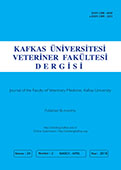
This journal is licensed under a Creative Commons Attribution-NonCommercial 4.0 International License
Kafkas Üniversitesi Veteriner Fakültesi Dergisi
2018 , Vol 24 , Issue 3
Cytotoxic Effects of Rhododendron ponticum L. Extract on Prostate Carcinoma and Adenocarcinoma Cell Line (DU145, PC3)
1Ankara University, Faculty of Veterinary Medicine, Department of Pharmacology and Toxicology, TR-06110 Ankara - TURKEY2Mehmet Akif Ersoy University, Faculty of Veterinary Medicine, Department of Pharmacology and Toxicology, TR-15030 Burdur - TURKEY
3Ankara University, Faculty of Veterinary Medicine, Department of Biochemistry, TR-06110, Ankara - TURKEY DOI : 10.9775/kvfd.2017.19219 Rhododendron species, having been used in traditional medicine for the treatment of inflammation, pain, cold, asthma, skin and gastro-intestinal disease, are distributed widely around the world. Mad honey obtained from the nectar of common rhododendron (Rhododendron ponticum L.), which is distributed throughout Black Sea region of Turkey, contains grayanotoxins, which are toxic diterpenes. The grayanotoxins, mostly grayanotoxins I and III, which are present in leaves, flowers and nectar responsible for toxicity of mad honey. The aim of this study was to investigate in vitro cytotoxic effects of the extract on prostate carcinoma cell lines. During the flowering period of common rhododendrons gathered from the Altinordu District of Ordu and dried under suitable conditions, extracted with distilled water and lyophilized. The cytotoxic activity of the extract of common rhododendron against human prostate carcinoma (DU145) and human prostate adenocarcinoma (PC3) cell lines by using the MTT and Neutral Red assay was evaluated. It was determined that the extract of common rhododendron had a dose-dependent cytotoxic effect. IC50 of the extract was found to be 283.3 and 169.9 μg/mL in MTT assay, and 307.6 and 346.0 μg/mL in Neutral Red assay for DU145 and PC3 respectively. The fact that common rhododendron has cytotoxic effects on prostate carcinoma cells suggests that it may be a potential therapeutic agent for anticarcinogenic activity. Keywords : Cancer cell line, Cytotoxic effect, DU145, PC3, Rhododendron ponticum L.










